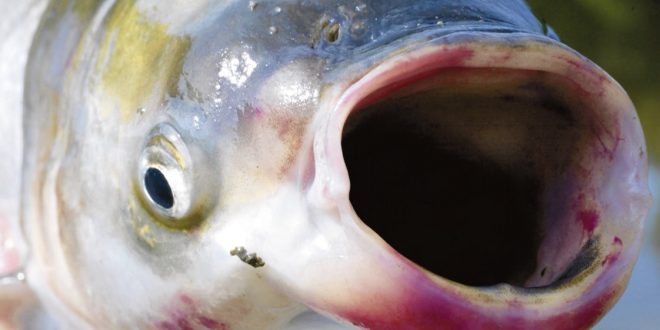Earthen barrier in Ft. Wayne to block invasive asian carp from entering Great Lakes.
Environmental officials are celebrating the completion of a nearly 2-mile-long, 80-foot-wide earthen berm designed to keep Asian carp from reaching the Great Lakes.
The $4.4 million project at the Eagle Marsh Nature Preserve in Fort Wayne is designed to block floodwaters and prevent carp from crossing from the Wabash River watershed into the Maumee River watershed, which empties into Lake Erie at Toledo, Ohio. The nature preserve drains into both watersheds.
“This is a great example of how a smaller investment up front can save a whole lot of money and heartache after the fact, after damage could have been created,” Cameron Davis, who coordinates Great Lakes policy for the U.S. Environmental Protection Agency, told the Fort Wayne Journal Gazette.
Eagle Marsh is considered the second-most important spot, after the Chicago Area Waterway System, for stopping the voracious invasive species from reaching the Great Lakes. Scientists say Asian carp could disrupt food chains and out-compete native fish.
The berm, which is 1.7 miles long and averages 7½ feet high, has been planned since 2014 and construction work began last fall.
“We don’t want to ever get to that point, where the fish are right there at the gate. We want to keep beating them back so that they never get to the Great Lakes,” Davis said.
The federally-funded project is complete except for plantings along the berm, said Betsy Yankowiak, director of preserves and programs for the nonprofit Little River Wetlands Project, which manages and co-owns Eagle Marsh.
Jane Hardisty, Indiana state conservationist with the U.S. Department of Agriculture-Natural Resources Conservation Service, said the project has benefits beyond stopping the Asian carp.
“The restored wetlands reach well beyond their boundaries to improve watershed health and the local economy,” she said.
Eagle Marsh, which covers more than 700 acres, is co-owned by the Little River Wetlands Project and the Indiana Department of Natural Resources
Agencies/Canadajournal

 Canada Journal – News of the World Articles and videos to bring you the biggest Canadian news stories from across the country every day
Canada Journal – News of the World Articles and videos to bring you the biggest Canadian news stories from across the country every day


That’s interesting. I’ve read a number of articles that chef’s LOVE cooking with . The flesh is nice, firm and plentiful and mild taste.
We should be looking to farm the carp and save the trout and salmon industries.